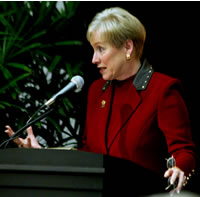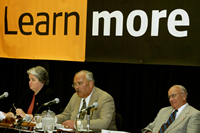
UW System President Katharine C. Lyall and Regent Vice President Toby Marcovich listen as Regent President Guy Gottschalk (center) opens the June meeting of the UW System Board of Regents, held at UW-Milwaukee. (Photos by Deb Generotsky, UWM Information and Media Technologies [9])
state budget bill is signed, Board of Regents President Guy Gottschalk said Thursday (June 5) at the board’s June meeting at UW-Milwaukee.
Cuts to the UW System’s proposed 2003-05 budget did not go any deeper than the governor’s proposal during the Legislature’s Joint Finance Committee budget deliberations, Gottschalk told the board. At the same time, “I won’t pretend to call a $250 million cut to our base funding a victory,” he said. “But in light of the fact that it could have gotten much worse, I do believe that we can declare that Engage Wisconsin was successful.”
As part of the Engage Wisconsin campaign, faculty, staff, students and community members at each UW institution offered input toward determining how to manage proposed cuts, ensuring the process was not a top-down directive from the regents, but rather, decision-making by those closest to campus, Gottschalk said.
Using this input, Gottschalk said, chancellors worked to create plans to manage the cuts through four principles cut administration first; merge or eliminate majors or programs with low enrollment; support a move-to-the-midpoint tuition policy; and lastly, adjust enrollment targets to reflect decreased staffing, if necessary.
Gottschalk, of Wisconsin Rapids, acknowledged that some may disagree with the results of this planning, but that “all voices were heard,” and such dissent is inevitable for a system of such size and complexity.
Gottschalk said he appreciated that the JFC has allowed the UW System to spread position cuts over the next two years of the budget cycle, rather than all in the first yeara requirement that would have been particularly harmful for the UW Colleges.
“I was also pleased to see that it was a bipartisan vote and that the committee allowed for campus-based decisions and did not micromanage,” Gottschalk said.
Gottschalk thanked all chancellors, provosts, faculty, staff and students for their contributions during the budget process. In addition, Gottschalk thanked members of UW alumni and foundation groups, local community leaders, editors, parents, and other friends of the university for efforts to reach lawmakers in recent months.
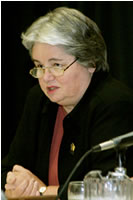
UW System President Katharine C. Lyall introduces a presentation on the scholarship of teaching and learning during the Board of Regents June meeting.
But, Gottschalk said, “In the words of the great philosopher, ‘It ain’t over ’till it’s over’. We must continue to see the process through, to implement its final outcomes, and to plan for the future.”
Toward achieving this goal, Gottschalk said he, UW System President Katharine C. Lyall, and Board Vice President Toby Marcovich of Superior, have drafted a case statement and outlines for a study about the future of the UW System. Work on the project should begin in earnest at the regents’ July retreat, he said.
Remarks by Regents President Guy Gottschalk
UW System announces national leadership role to advance teaching and learning
The UW System and UW-Milwaukee will work in cooperation as part of a leadership site for a national initiative that seeks to strengthen teaching through the enhancement of learning, the Board of Regents learned Thursday.
The UW System will serve as one of 12 national leaders in the American Association of Higher Education Carnegie Academy Campus Program in the Scholarship of Teaching and Learning (SoTL).
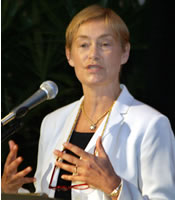
Dr. Pat Hutchings of the Carnegie Foundation on the Advancement of Teaching puts in context for the board the importance of scholarship on teaching and learning.
Such scholarly inquiry will allow the UW System to develop and share knowledge about teaching methods and learning patternsknowledge which is “really the core of our mission,” said UW System President Katharine C. Lyall.
On Thursday, Lyall introduced to the board Pat Hutchings, of the Carnegie Foundation for the Advancement of Teaching, who put in context the importance of scholarly study about teaching and learning.
Hutchings defined the scholarship of teaching and learning as the practice of allowing faculty to seek better classroom strategies, track effectiveness in student learning and to share results with colleagues. Said another way, Hutchins described such study as a way for faculty to bring their knowledge, skills and values as scholars to their work as teachers in a university setting.
“It warms my heart to see teaching and learning at the top of the agenda,” Hutchings said.
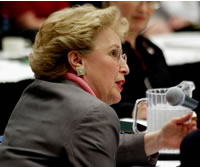
Regent Peggy Rosenzweig of Wauwatosa voices her thoughts on the AAHE/Carnegie initiative on teaching and learning.
The AAHE/Carnegie initiative comes during a national movement for such study, Hutchings said. UW’s contribution is expected to help faculty to use scholarly talents to improve their students’ learning; to help campuses develop programs and rewards that support this work among faculty; and to more fully meet the educational needs of society, she said.
“It’s time for campuses to step up and take this work forward, working with other campuses where it makes sense,” Hutchings said of the site.
The leadership site will be located at UW-Milwaukee and coordinated by the UW System’s Office of Professional and Instructional Development and UWM’s Center for Instructional and Professional Development.
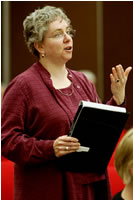
Lisa Kornetsky, director of the UW System Office of Instructional and Professional Development, further explains the UW- Milwaukee-based initiative on the scholarship of teaching and learning.
OPID director Lisa Kornetsky and Tony Ciccone, a UWM professor and CIPD director, said the decision to combine efforts under the AAHE/Carnegie initiative is an example of collaborating “the Wisconsin way.”
“We think it’s the way to get things done,” Ciccone said.
Kornetsky told the board that organizers will consider the effort a success if a number of criteria are achieved. They include:
- A well-established Leadership Site that is known and accessed across the UW System;
- SoTL initiatives at each campus that demonstrate outcomes on student learning and faculty development;
- Collaboration between and among campuses with similar strategic objectives;
- National recognition and external funding to support the leadership site’s activities; and
- Linkages between the SoTL initiative and larger UW System priorities.
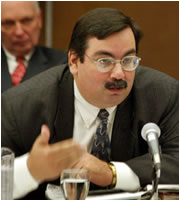
Regent Jose Olivieri of Milwaukee asks how the board can help shape policy regarding the scholarship of teaching and learning.
In response to a question from Regent David Walsh of Madison, who asked if this initiative might help the UW System meet some of Congress’ recent calls for increased accountability at institutions of higher education, Hutchings said the effort might help gather important evidence about student learning.
“Higher education needs to seize the accountability agenda and make it its own,” she said.
Regent Jose Olivieri of Milwaukee wondered how the board might make policy decisions in light of forthcoming study on teaching and learning.
“Our culture has kept us very private in the classroom,” Kornetsky replied. “We’re asking for a cultural shift toward a more communal way of thinking.”
“If you really want to deepen and extend student learning, you need to invest in that,” Hutchings added.
Washington Post editor credits scholarship to UWM for his “step up in life”
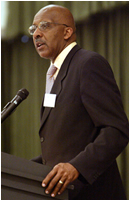
Milton Coleman, deputy managing editor of The Washington Post, describes how his scholarship to UW-Milwaukee was a turning point in his life.
Winning a scholarship to attend UW-Milwaukee was a key turning point that provided a “step up in life,” said Milton Coleman, deputy managing editor of The Washington Post and UW-Milwaukee alum, during a luncheon presentation to the board on Thursday.
The UW must continue to provide similar opportunities for students in the future, stressed Coleman, who grew up in public housing and attended Milwaukee Public Schools.
Coleman said his family’s financial situation did not allow an opportunity to save for college.
“I don’t know what I would have done without that scholarship which if I remember correctly was $128 a semester,” said Coleman, the first in his family to attend college. “When all was said and done, that was my ticket to ride. It was like a handshake to me. It said to me, ‘I’m a scholar’.”
Coleman said his Wisconsin college experienceand that of othershas proven that UW is “a place where everybody can be somebody.”
Coleman said he owes a great deal to his time at UWM and to his editors at the Milwaukee Courier, where he got his start in journalism.
“I’m certain I never would have gotten to the Post if it wasn’t for what I learned from [Courier editors],” he said. “The same is true about what I learned here at UWM.”
Coleman said that many people told him, “not everyone can be deputy managing editor of The Washington Post. But Milton Coleman is the deputy managing editor of The Washington Post and I came out of here,” he said.
Now, Coleman said, he is active is in raising and awarding scholarships for students in the Washington, D.C. area. He has been involved with scholarship programs connected with the Post and through his church, which was founded by slaves who knew education was essential for freedom.
“We see education as a liberator and an equalizer,” Coleman said. “I would hate to see people stop taking chances, because people took chances on me. It would be foolhardy to abandon commitments and not to make future commitments.”
Coleman announced Thursday that he will join the UWM Chancellor’s Society the top tier for UWM alumni giving. His financial contributions will include a double-matching commitment from the Post, he said.
“I believe my alma mater can really make a difference in this city, this state and in this world, in the same way that scholarships that ticket to ride made a difference for me,” he said.
Education Committee continues discussion of teaching and learning
The Regents’ Education Committee on Thursday continued the morning discussion on the need to encourage the development of teaching skills among UW faculty and instructional staff. The committee members plan to return to the issue of what “employment development” actions can be taken to encourage good practices, and the rewards and structure that are needed to implement this goal. The observation was made that each campus has its own initiatives to improve teaching, and these will be linked with System and national efforts. The luncheon presentation by Milton Coleman of The Washington Post was applauded as inspiring and a great motivator for all in attendance.
Committee Vice Chair Fred Mohs of Madison, who convened the session, launched the next phase of the meeting with the question, “If education is a lifelong companion, shouldn’t it be accessible, inclusive and excellent?”
UWM Chancellor Nancy L. Zimpher then introduced the work of the Black and Gold Commission, formed 20 months ago to assure that the student experience improved as the university evolved into a premier urban institution. She described how town meetings were held and interviews were conducted to find creative ways to improve the student experience on campus. Recommendations were made by the 2001-01 Black and Gold Commission to:
- Adopt an “Investing in UWM’s Students” culture throughout UWM.
- Organize student services and assistance for student success.
- Maximize student learning through instructional strategies.
- Increase connections and invest in diversity by providing students with a variety of experiences
The work of the current (2002-03) Black and Gold Committees was detailed by Amanda Snyder, a graduate student in communication. Committees have been formed in every one of UWM’s schools and colleges, and student representatives described initiatives that range from installing first aid boxes to establishing cohort learning. Kory Kozloski, a junior in pre-law and president of the UWM Student Association, described a “Black and Gold mentality” that is bringing together all groups on campus and improving UWM student success and satisfaction.
The regents commended UWM for the time spent on this effort, and asked Zimpher to advise them on what could be put in place to enhance and encourage these efforts.
Regent Mohs described how this year, the committee has maintained its focus on student success while seeking to answer the question of how the UW System continues to pursue quality during a period of fiscal restraint.
“One key to this is how to measure quality in the UW System,” Mohs said. “Given the present budget environment, the challenge is to not aversely affect quality as we attempt to maintain accessibility.”
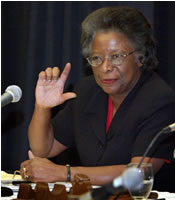
Cora Marrett, UW System vice president of academic affairs, speaks to the regents Education Committee.
A study was done to address the issue of how different stakeholders view quality, although the survey was very limited in scope. Nevertheless, discussions and observations with these varied stakeholders seemed to show that they had different ideas of what priorities, such as access or diversity, meant. Internal stakeholders (regents, chancellors) and external stakeholders (those outside of the academy) all valued the same elements, but had different priorities.
The committee is working to develop leading indicators for the UW System, similar to the leading economic indicators that are used to gauge the economy. Potential leading indicators include student-faculty contact, support services for students, campus environment and access. The hope is that by developing systems that track these indicators, any change in them could be monitored and corrections could be made before outcomes were affected.
Next, a report on remedial education showed that only half of the national average of UW students requires English remediation. The number of students needing math remediation has fallen during the period charted, 1992-92 through 2001-02. There are high rates of second-year retention for those completing remedial education, with the rates very close to those for students not required to take remediation. Because multiple factors influence graduation rates, it is difficult to focus on remediation alone. But six-year rates show that the availability of remediation results in 1,000 graduates who would not otherwise have received a diploma.
State Superintendent Elizabeth Burmaster reviewed her 2002-2003 series of discussion with PK-16 partners. The regional discussions are hosted by UW chancellors, with invited guests including presidents of Wisconsin technical colleges within the region, deans of two-year college campuses, CESA administrators, and presidents of private colleges and universities in the region. Regent Burmaster emphasized the commitment to partnerships she has witnessed throughout the state. The idea of PK-16 as the long-term foundation for economic and workforce development is inspiring these partnerships. “We are developing the political will to make education the top priority in the state,” she said.
In another action, the committee approved the UW-Milwaukee Center for Charter Schools contract with Woodland School, Inc.
Business and Finance Committee learns more about online Ph.D. in nursing
UW-Milwaukee’s newly introduced online doctoral program in nursing, the first of its kind in the country, has attracted a younger, more diverse group of students than is typical of nursing doctoral programs nationally.
That’s what Sally Lundeen, dean of UWM’s School of Nursing told members of the Board of Regents Business and Finance Committee Thursday.
The program, designed to help address the national nursing shortage, has attracted 27 students from all over the country. While more students are applying to nursing schools, many are being turned away because of a nursing faculty shortage, said Lundeen.
The first group of doctoral students was on campus at UWM last week for orientation, but will be completing the coursework for the Ph.D. in nursing from their home communities.
UWM is the first nursing program in the country to put an existing on-campus doctoral nursing program completely online.
UWM’s doctoral program, which also has 40 on-campus students, was ranked 29th nationally out of more than 300 programs by U.S. News and World Report.
The program is an excellent fit with UWM’s philosophy of encouraging and supporting nontraditional learners, said Lundeen. “Many of our students can’t take four years off to go away to school,” she said.
In other business, the committee approved a resolution to defer presentation of the UW System’s pay plan for faculty and staff because of uncertainties related to the state budget process. The committee also approved resolutions for differentiated tuition for programs at UW-Superior and UW-La Crosse, and heard a report on ways to build the UW-System’s resource base.
Physical Planning and Funding reviews UWM proposals
UW-Milwaukee officials unveiled a proposal to the Regents Physical Planning and Funding Committee Thursday that would add badly needed student housing to its campus by acquiring the adjacent Columbia Hospital complex. The university wants the regents to add the project to its capital expenditures gradually over the next three bienniums.
If approved, it would mark the first time in 40 years that UW-Milwaukee would be physically expanding its 92-acre campus boundaries.
UW-Milwaukee will spend the next four years studying and possibly calling for bids on the project. The current budget allows for a consultant to study possible uses for the 11-acre plot, which includes four buildings and a parking structure. In the 2005-07 budget, UWM will ask for a design
consultant and take bids on the cost of the project. With those phases complete, UWM is targeting the 2007-09 budget for construction to begin.
Acquisition of the property would increase the campus by 20 percent and increase the amount of parking on campus by more than a third.
Bob Greenstreet, dean of the UWM School of Architecture and Urban Planning, said the addition of the Columbia property would transform the entire northwest quadrant of the campus, increasing green spaces and places for students to gather, and bringing all student services together near the Sandburg Residence Halls. The “one-stop” student services hub would be called “The Panther Way,” and would serve as a second student union, said Greenstreet.
Committee members also were briefed on a UWM idea to have private developers renovate the nearly century-old Kenilworth Building a mile from campus into a mixed-use complex that would combine student housing with retail space. In 2001, UW-Milwaukee became sole owner of the huge building that originally was a factory for Ford Model Ts.
In other business, the committee approved increasing the budget of the UW-River Falls Child Care Center by $476,000 program revenue supported borrowing.
Friday Meeting
The Board of Regents will resume its June meeting on Friday (June 6) starting at 9 a.m. in the UWM Union’s Wisconsin Room.
#####
Laura Hunt, Beth Stafford and Kathy Quirk from UWM University Relations and Communications and Deb Generotzky and Pete Amland from UWM Information & Media Technologies contributed to this report.

